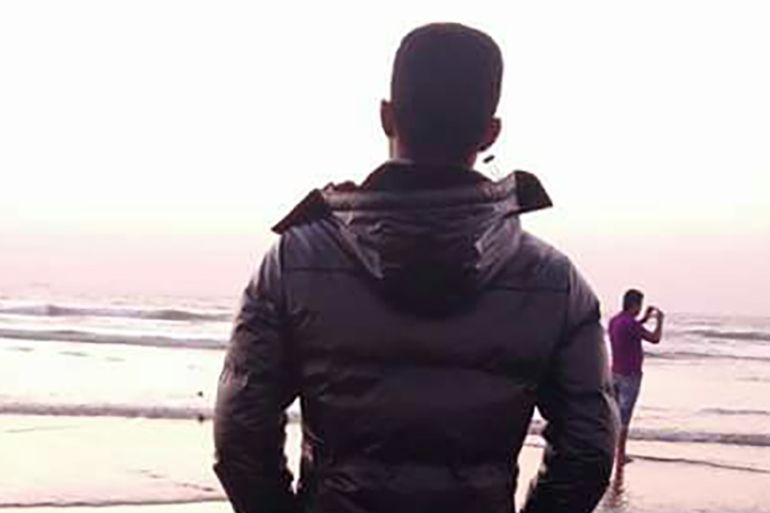‘I have no words to tell them’: A Rohingya fixer
In part two of a series on journalism fixers, Al Jazeera talks to a Rohingya helping report on fellow refugees.

For fixers, news stories are often personal.
They are locals, sometimes journalists themselves, who serve as guides for foreign correspondents.
Keep reading
list of 4 itemsNPR editor resigns after accusing US outlet of liberal bias
Lawmakers brawl as Georgian Parliament considers ‘foreign agent’ bill
Journalist loses foot after being badly wounded in Israeli attack in Gaza
Equipped with intimate local knowledge, they find stories, secure interviews, and translate for correspondents who may have little experience in the country they are reporting from.
Long after those correspondents have left, fixers remain in their communities.
If they become associated with a controversial story, the consequences can be severe – public backlash, imprisonment or worse – regardless of whether the fixer had any influence over how the story was told.
In 2017, 450 fixers and reporters were asked about their relationship for a survey by the Global Reporting Centre.
Most fixers said they felt they were often or always relied upon for logistical guidance; many said they believed their trust had been violated – some in terms of editorial content, for others the violation related to financial matters. Many said they rarely received credit for a story and a small number said they – or their relatives – had been put in future harm.
But the possibility of helping to shape how their countries are represented in the media can be a powerful pull.
In the second part of a three-part series profiling fixers, Al Jazeera talks to a Rohingya helping cover stories in Bangladesh.
| Robbi*, 25 |
!['I become nervous listening to some stories because I have no words to tell them' [Courtesy: Robbi*]
'I become nervous listening to some stories because I have no words to tell them' [Courtesy: Robbi*]](/wp-content/uploads/2018/03/00e1bdb942cb4d2dbf16c319b0f4c5bd_18.jpeg)
‘I become nervous listening to some stories because I have no words to tell them’ [Courtesy: Robbi*]
As a Rohingya born and raised in refugee camps in Bangladesh, Robbi* is well placed to help tell the stories of fellow Rohingya refugees.
“I very much enjoy playing football, cricket, volleyball, table tennis, whatever I like. Three months ago our university organised a cricket tournament and I was selected best player.
I grew up inside camps with a lot of other people. There were six rooms in a shelter and each room was eight by 10 feet. Outside of my house, there were a lot of families, at least 30 or more.
My childhood memories [involve a lot] of struggles because we didn’t get any facilities for studying or [medical care] and we don’t have any permanent rights as human beings.
The sky that I saw, the environment I was in from the time I woke up in until the time I went to bed was the same. We have been passing our long years [here].
It was very heartbreaking [for my family]. Around the time I was born, my five- or six-year-old brother Noor Islam died because of the lack of proper treatment.
Even now, most of the Rohingya have fled to Bangladesh but they don’t get proper treatment.
You are a human being. Is it possible to live with only primary medical support? I am asking you. Is it possible to live through a dangerous sickness or life-threatening problem – is primary treatment enough for you? I think not.
For the past five years, I have been fixing and translating with media. I get pleasure from this work.
I have worked with many different journalists so now I can give comments or suggestions or reports, because I have knowledge about a certain topic.
[One story I helped fix for Arabic-speaking outlets] was about Jamalida. Jamalida was one of the brave girls who was raped by the military and lost her husband who she loved very much.
I become nervous listening to some stories because I have no words to tell them, nothing to explain their situation.
It is important to me to meet many kinds of people and communities. I can learn many things just from hearing someone explain their feelings, and I can be a witness to their problem or condition or situation.
Another important thing is showing hospitality. For a guy who comes to take photos or do a report, I can guide him and share many things with him.
Another point is that I don’t have other options being a Rohingya refugee. After I finish studying, what would I do, who would accept me, how would I get a job in Bangladesh or somewhere else? I don’t know, but there is nothing preventing me from being a fixer and I do useful work.
Most of the people I work with love me and are supportive of my education.
My parents also motivate me and support me. But my family still cannot support me for my education because they don’t have much money.
Sometimes I face difficult situations. Last year, I couldn’t pay my semester fee and I felt like I had failed. I felt totally senseless and I cried. But by the blessings of the mighty God, I asked one of my friends if they could help and I collected money from others.
I motivate myself and have set goals for my life, including completing my graduation. Even though I am Rohingya, I have a life and goals like other Bengali people.”
This interview has been edited for clarity and length
*Name changed to protect identity
—
Read about other fixers in the series here: